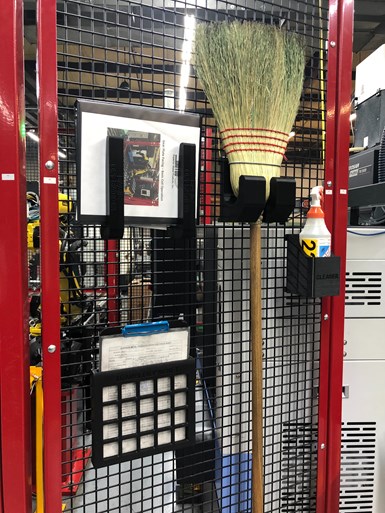Lean Means Being Comfortable
Like writing, lean manufacturing requires people to be comfortable in their own skin while checking any ego issues at the door.
Workplace organization is one example of where shopfloor employees can offer helpful improvement suggestions as they work right where the rubber meets the road.
There’s inherent nakedness involved in writing for a magazine like Production Machining. The articles we create end up in print and online, bare and unprotected for the world to see. This requires us to be comfortable in our own skin, warts and all, as we transform our thoughts, ideas and premises into words, sentences and paragraphs for the manufacturing community’s consideration. Our goal is to communicate new concepts and describe new technology we discover that can help machine shops become more profitable operations.
As writers, we also can’t have such big heads that we’re not able to accept constructive criticism from fellow editors who proof our articles looking for grammar goofs, subpar sentence structure and the like. Their suggestions invariably result in a better read, and the cumulative effect is a better overall reader experience.
In a machine shop, there are aspects of lean manufacturing that call for a similar degree of ease, honesty and humility from both employees and management. For instance, the only way a lean culture can take root is for everyone — not just owners or managers — to be engaged and on board with continually identifying waste and establishing ways to become more efficient. Lean manufacturing plateaus or stalls when only a company’s higher-ups drive change initiatives. Total involvement requires that employees are comfortable suggesting changes with no fear that their ideas might be thought of as inane. Therefore, management must work to establish an environment that fosters openness and conveys to employees that all suggestions will be thoughtfully considered. Plus, it should be clear that even suggestions for small changes are welcome, as those accrue over time.
In turn, good lean leaders must table any ego issues when employees point out supervisors’ mistakes. Management also must be able to recognize that the company has process limitations and, in instances in which a lean consultant is hired, accept constructive (possibly blunt) criticism when shortcomings and inefficiencies are highlighted.

Paul Akers, a lean guru and owner of a successful product development company called FastCap, touches on that concept in his book “2 Second Lean,” in which he suggests that underutilized employee know-how and brain power is an additional form of waste.
Of course, the Industrial Internet of Things (IIoT), additive manufacturing, artificial intelligence and collaborative robotics are examples of emerging technologies that will change the nature of how manufacturers make parts. In a growing number of instances, they already are doing that. But, regardless of the manufacturing process or method, the concept of lean should remain at top-of-mind for all parts producers to streamline their operations. And that’s why it’s critical to mind the people part of lean.
True lean can only be achieved when all are on board, focused on the same goal while feeling comfortable in their role helping the company become more successful.
Related Content
-
One Shop’s Tale to More Standardized Tool Organization
Contract manufacturer JD Machine’s 5S mindset led it to discover a more sophisticated way to standardize tooling storage for its various production cells.

















